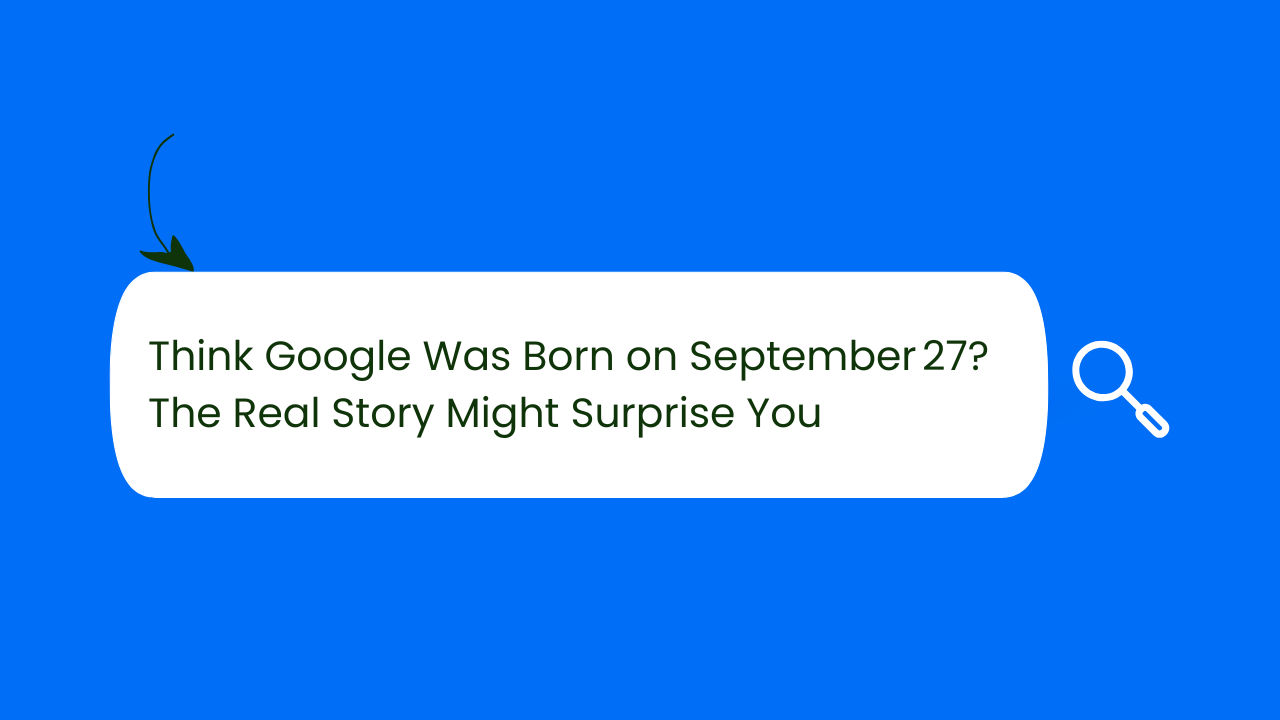Latest Updates
Think Google Was Born on September 27? The Real Story Might Surprise You
Every tech enthusiast — or anyone who’s ever opened a browser — recognizes Google. Its name is synonymous with search, innovation, and disruption. And yet, many hold a quirky “fact” as gospel: Google’s birthday is September 27. But is that really the true origin story?
As a tech consultancy, Lifza Tech loves diving into myths, truths, and the gray zones in between. Let’s peel back the layers — from founding dates and ownership to leadership and curious coincidences — and see what lessons we can borrow for startups, scaleups, and digital strategies.
The September 27 Myth & the Founding Reality
Why does Google celebrate September 27?
Every year, Google marks September 27 with a special doodle and public fanfare. In 2025, for instance, they revived their original 1998 logo as a nostalgic homage. The Times of India+1 Over time, the date has become the de facto “birthday” in the public imagination.
But behind the scenes, Google’s actual incorporation date is September 4, 1998. About Google+1 In fact, Google’s own “Our Story” page states:
“Incorporation: September 4, 1998” About Google
Then why shift the celebration to September 27? Multiple sources suggest that Google chose September 27 around 2002 or so because it was the date the company announced a record number of pages indexed. The Economic Times+2The Economic Times+2 Over time, that symbolic date stuck. So while the real “birth certificate” says September 4, the tech world has embraced September 27 as the party day.
In short: September 27 is more branding and ritual than literal. It’s a reminder that sometimes narratives — even corporate ones — matter as much as facts.
Who Was Born on September 27?
Since you asked, this is a fun interlude. People born on September 27 straddle the realm of arts, sports, activism, and pop culture. Let’s spotlight a few:
Gwyneth Paltrow (born 1972) — Actor, entrepreneur. UPI+2UPI+2
Lil Wayne (born 1982) — Hip hop legend. FamousFix.com+3UPI+3UPI+3
Avril Lavigne (born 1984) — Pop-punk singer‑songwriter. UPI+2FamousFix.com+2
Meat Loaf (born 1947) — Iconic rock singer. UPI+2City2Map+2
Steve Kerr (born 1965) — NBA figure (player/coach). City2Map+1
Mata Amritanandamayi (“Amma”) (born 1953) — Indian spiritual leader known for humanitarian work. legendaryperson.com
And more: authors, politicians, artists — the list runs deep. Wikipedia+2kidpaw.net+2 It’s a day of creative energy, which could (if you like) make for a strong thematic blog tie-in: if your founder’s birthday is September 27, for example, you could lean on “sharing a day with visionaries” as content.
Who Owns 51% of Google?
This question is more nuanced than it seems, because Google (or more precisely, Alphabet Inc., Google’s parent) uses a multi-class share structure that blurs simple “ownership” claims.
Understanding Alphabet’s ownership structure
Alphabet, the parent under which Google now sits, issues three classes of shares:
Class A (GOOGL) — one vote per share
Class B — held by insiders/founders, with 10 votes per share
Class C (GOOG) — no voting rights
Because of the 10× voting weight of Class B shares, those shares carry much greater control per share. Reddit+2The Motley Fool+2
Larry Page and Sergey Brin, the founders, hold significant Class B shares. Even though their percentage ownership might be relatively small (around 3% each in publicly reported stakes) Ora+4The Motley Fool+4Ora+4, their voting rights combined with other insiders give them effective control over a majority of votes. Ora+3Ora+3The Motley Fool+3
Thus, when someone says “who owns 51% of Google,” the more accurate answer is: the founders + insider class B shares control a majority of voting power, though institutional investors may own the majority of economic/financial shares.
To sum up:
Institutional investors hold the majority of the shares by number (especially Class A and C). The Motley Fool+1
But the founders and insiders wield majority control through high‑voting shares (Class B) — which is why many say Google (Alphabet) is still under the effective control of its founders. Ora+2The Motley Fool+2
So the short answer: there’s no public figure owning 51% of Google in straight equity, but a small group (the founders + insiders) controls over 50% of the voting power. That delicate equilibrium is a lesson in governance, share structure, and power even in a “public” company.
Google’s 27th Birthday Date
Since we already touched on the September 27 ritual, here’s how the “27th birthday” plays out:
Google celebrated its 27th anniversary on September 27, 2025, with nostalgic branding and logo throwbacks. The Economic Times+3The Times of India+3The Economic Times+3 The company leaned into the symbolism: 27 years since its early days of indexing pages, scaling out, and reshaping the internet.
Yet, if you track chronology:
Founded/integrated: September 4, 1998 About Google+2Encyclopedia Britannica+2
Celebrated “birthday” traditionally on September 27
So in 2025, Google marks 27 years in the public imagination — a clever marketing alignment between myth and mathematics.
From a consulting lens: this is a great case of how a company can define its narrative and anchor celebrations — even if the technical date is elsewhere. It reminds founders: your story and ritual matter as much as your formal documents.
Who Is the CEO of Google?
As of 2025, Sundar Pichai is the CEO of both Google (since 2015) and its parent company Alphabet Inc. (since December 2019). Encyclopedia Britannica+4Wikipedia+4Encyclopedia Britannica+4
A brief journey of Sundar Pichai
Born June 10, 1972 in Madras (now Chennai), Tamil Nadu, India. Encyclopedia Britannica+2Wikipedia+2
Studied metallurgy (B.Tech) at IIT Kharagpur. Encyclopedia Britannica+4Encyclopedia Britannica+4Wikipedia+4
Went on to earn an MS from Stanford University and later an MBA from the Wharton School. Encyclopedia Britannica+2Encyclopedia Britannica+2
He joined Google in 2004, initially leading product management (Google Toolbar, Chrome) and climbing ranks. Encyclopedia Britannica+4Encyclopedia Britannica+4Encyclopedia Britannica+4
In August 2015, in the corporate restructuring that birthed Alphabet, Pichai was appointed as CEO of Google. Encyclopedia Britannica+2Encyclopedia Britannica+2
Then in December 2019, Pichai took over as CEO of Alphabet as well, consolidating leadership. Encyclopedia Britannica+2Encyclopedia Britannica+2
Pichai has since steered Google/Alphabet through AI pivots, cloud expansion, hardware bets, and regulatory headwinds. He is widely regarded as a stabilizing presence in the transition from founder-led to professional management.
Lessons & Reflections for Lifza Tech Consultancy
As you build or scale your own tech or digital business, these Google-centric “quirks” offer deeper lessons:
Narrative > Dates
Google’s choice of September 27 as its public birthday — over the actual incorporation date — shows how narrative solidifies culture and public memory. Don’t shy from choosing your own “celebration day” (launch day, first paying client day) and building rituals around it.Power structures matter
Google’s multi-class shares and founder control illustrate that equity ownership is not always direct control. When advising startups or founders, always highlight governance, voting rights, and long-term control arrangements.Leadership succession is strategic
Pichai’s rise, from product leader to CEO of Google and then Alphabet, reminds us: build your internal bench, empower successors, and ensure the vision continues beyond founders.Brand, myth, and messaging
The way Google turns September 27 into a celebrated moment shows how a company can harness mythos, nostalgia, and marketing in building brand equity over time.Sustainability over flash
Despite decades of innovation and expansion, Google keeps reaffirming its founding mission (“organize the world’s information”) even as it stretches into AI, cloud, health, and more. A consultancy must keep core values anchored while exploring new domains.
Closing Thoughts — From Lifza Tech
Google’s story is not just about search algorithms or scaling infrastructure; it’s about identity, narrative, governance, and leadership. As Lifza Tech, when we help clients build their digital journeys, we don’t just deliver code or strategy — we help them shape their lasting stories, craft structures that endure, and launch rituals that resonate.
If you like, I can customize this blog with your examples, your branding tone, or a CTA that fits your service offerings. Do you want me to polish it further or adapt it for your website?



